The Beautiful Side of Davos
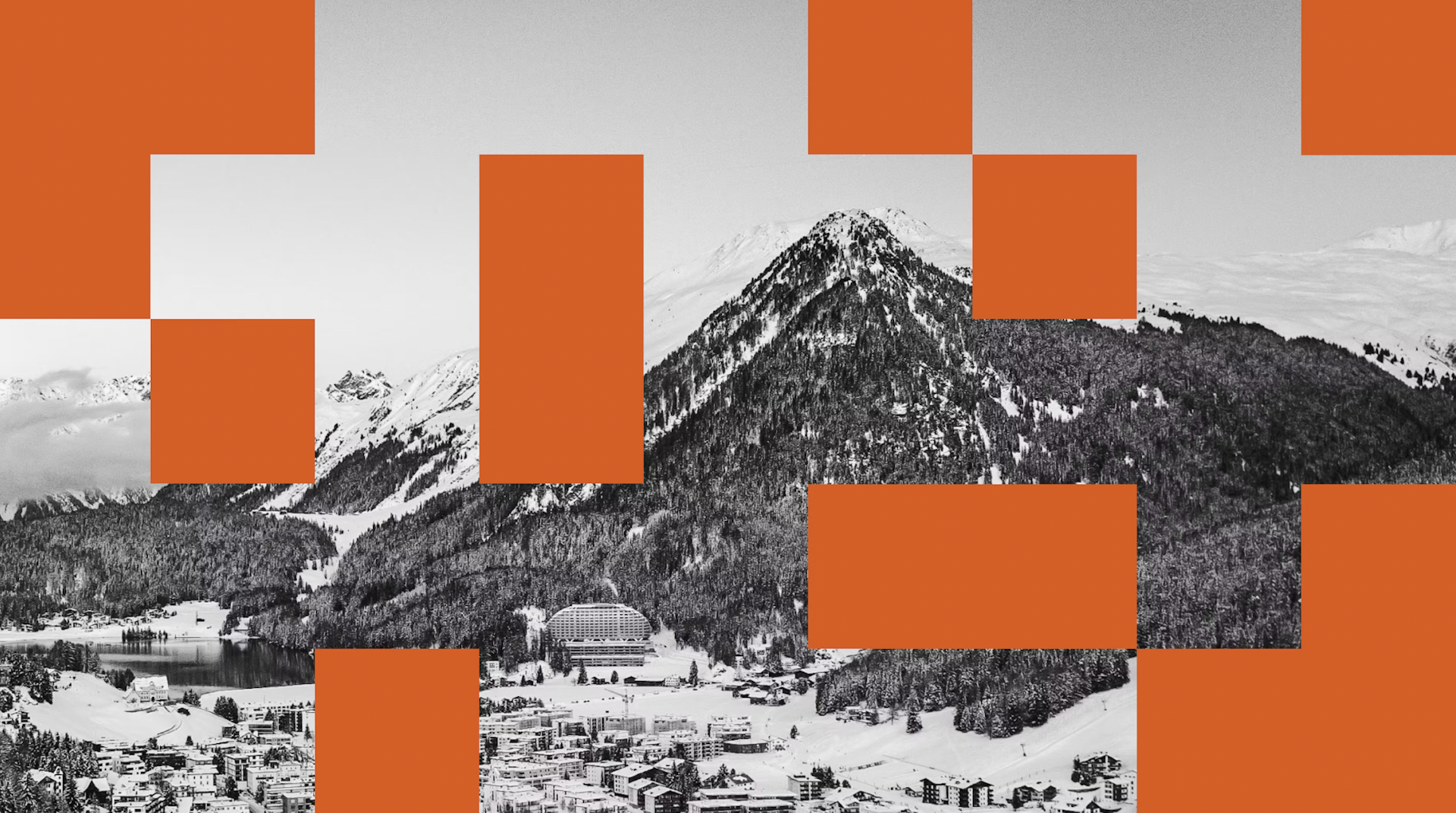
It’s been a fascinating and highly stimulating few days in the snowy Swiss mountains. Sure, the Annual Meeting of the World Economic Forum is controversial (and has even produced “Davos Man,” a caricature of the hobnobbing, arrogant, willfully blind homo economicus, alongside its usual slew of scandals—see Microsoft and Sting), but nowhere else do you find such a density of high-level connections and quality conversations about the future of our economies, societies, and planet.
If you want to make business more beautiful, you cannot not be in Davos.
This is why we decided to bring a pop-up version of the House of Beautiful Business to Davos this year for the first time. While the big guns convened in the convention center and its secretive backrooms, we co-hosted our own Art of Business forum, along with the SAP Intelligent Enterprise Institute and La Zuleta at the Davos Heimatmuseum, the “Museum of Belonging”—literally and metaphorically off the beaten path.
Our aim? To challenge existing paradigms and look at how we might move beyond conventional, if powerful, tools such as data, science, and technology, and draw from the arts and humanities to bring a more creative and bolder imaginative scope to the challenges ahead. To that end, our three main program tracks—entitled “A New Consciousness,” “Climate Imagination,” and “Homecoming”—brought together an exciting array of guest speakers.
We learned that the AI revolution, in the form of ChatGPT, has finally arrived (and is coming for our jobs…); that Web3 and its infrastructure is here to stay; that the metaverse must be diverse to avoid the shortcomings of Web2; and that synthetic biology has huge potential but remains underfunded. We also heard that growth alone is no longer good enough, that Europe needs to get its act together on clean tech, and that ESG might have become too politicized to still serve as an effective framework. We also observed that Western business is struggling to cope with Russia’s absence: a recent study indicates that only about eight percent of EU firms have divested from the country.
On balance though, despite or because of all this, we were reminded that the shift from the human-centered to the life-centered economy is unstoppable.
Our debut Davos experience also took us outside the Heimatmuseum. We hopped from lounge to lounge, party to party, house to house (Davos really is, along its main drag, the Promenade, a trade show of sorts for the most powerful), listening and speaking not only to business leaders and experts in everything from tech to management, but also political activists from Iran, military personnel from Ukraine, Buddhist monks bringing Dharma to the metaverse, and art curators running the first NFT museum on the blockchain. We attended concerts by local musicians, ate self-baked bread with advocates for gender and racial inclusivity, and met many activists working hard to shift the corporate agenda towards a more climate-friendly future.
Below are some highlights from this inspiring side of Davos: the voices of changemakers seeking a softer, more inclusive, more beautiful (business) world.
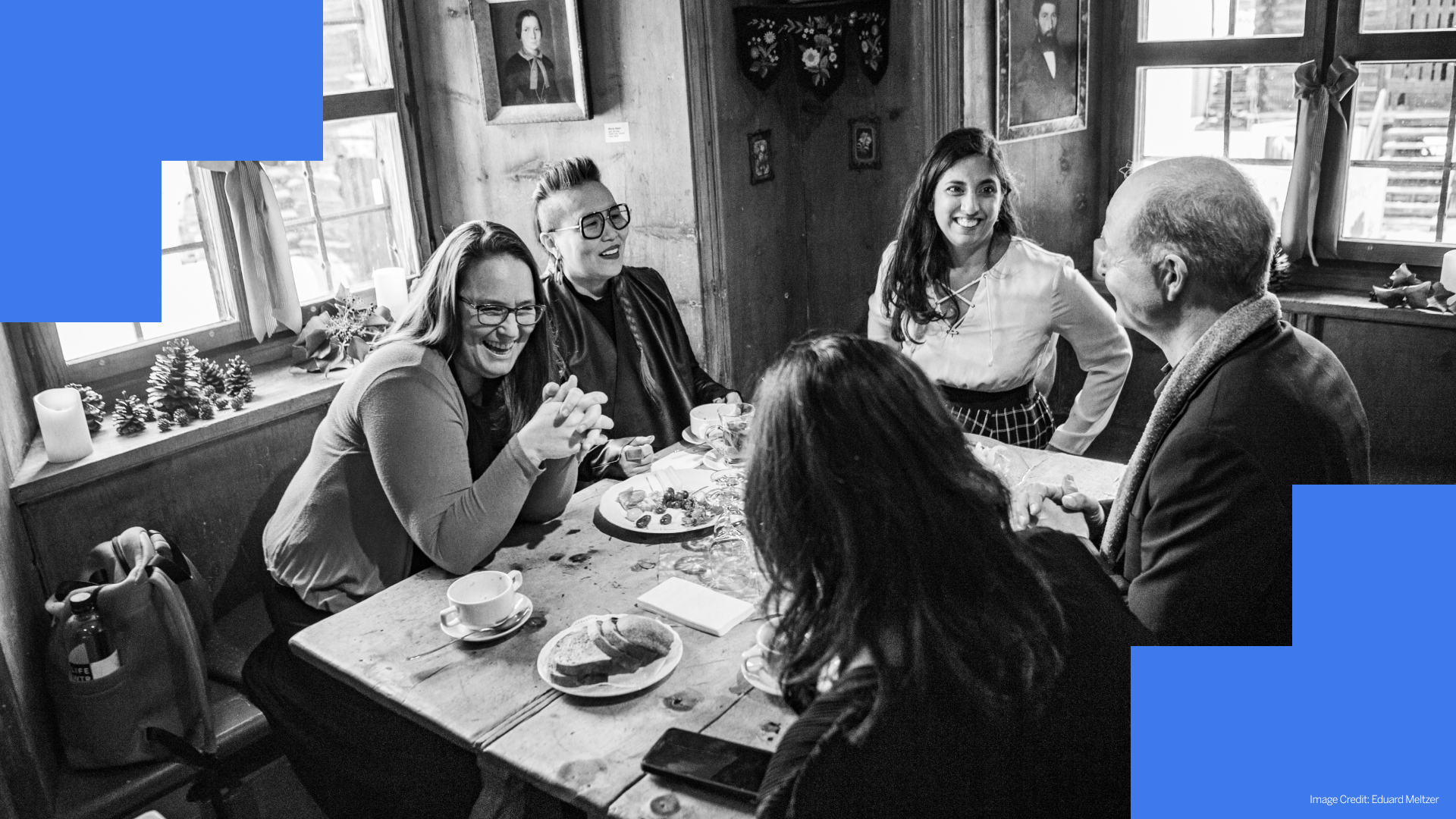
ALEXANDER HILLER
managing director at Russell Reynolds, on the skills required from future leaders
“I think the key concepts have been there all the time, as in the hard and the soft qualities—but I think what we need now is that it’s no longer optional. In the past, you could have probably been a bit more linear, a bit more structured, a bit more ‘top down’…a bit more focused on the what, and less on the how, but I think that's going away. So leaders need to better understand who they are and what they bring, and what they might sometimes forget about, be it health, looking outside, getting fresh ideas, nurturing or nourishing themselves. But also, leaders being role models that people look up to, have to create the environment that they want to bring themselves to work for. They need to be self aware, humble, empathetic, and allow people to grow and learn how to have some sort of mastery and autonomy to do their best work, and how to be their best selves—also at work.”
VERENA AUGUSTIN
global sustainable innovation leader at PwC, on the need for an inclusive stakeholder ecosystem
“I think we need to shift into a low-ego, high-impact mindset. I’ve been working in innovation for the last 15 years, and it was always about individual needs—consumer-driven, consumer centricity—and we really need to embrace an ecosystem view that is inclusive for all stakeholders. And when I say stakeholders, I’m also talking about the planet as one of the key stakeholders. So it's really about moving away from driving growth, and towards driving value in a collaborative way.”
JESSICA APOTHEKER
global CMO, managing director, and partner at the Boston Consulting Group, on ChatGPT AI and job replacement
“If we think of the part of consulting that would be generated by ChatGPT and reliant on the open-source technology that everybody's going to have, what's going to be critical is, as a consulting firm: can you develop your own version of this? That is, a meaningful asset you can leverage that actually makes you better than the others? All of a sudden we’re going to have to compete in terms of building that type of technology. And in journalism and media it's going to be very similar. Because if everybody uses the same open-source algorithm, then there’s going to be nothing interesting, right? So we're all going to have to build and expand on it and make it smarter and more customized to what we want to say. And with that, there will still be a richness in what we do.”
SHOUKEI MATSUMOTO
monk and founder of the Interbeing Project, on ancestry and AI
“The existence of ancestors could be a bridge between the people who are interested in spirituality, and those who are not. Even for those who are not interested, the question of how we can become better ancestors works. Because we almost all want to be good ancestors for others, right? Now, and for future generations. If you have children, or grandchildren, this idea comes up naturally. But it also does for those who don’t have any direct children or grandchildren. It's natural for human beings to want to leave something, a legacy. So this question is very simple, and also universal. I think it’s very powerful.”
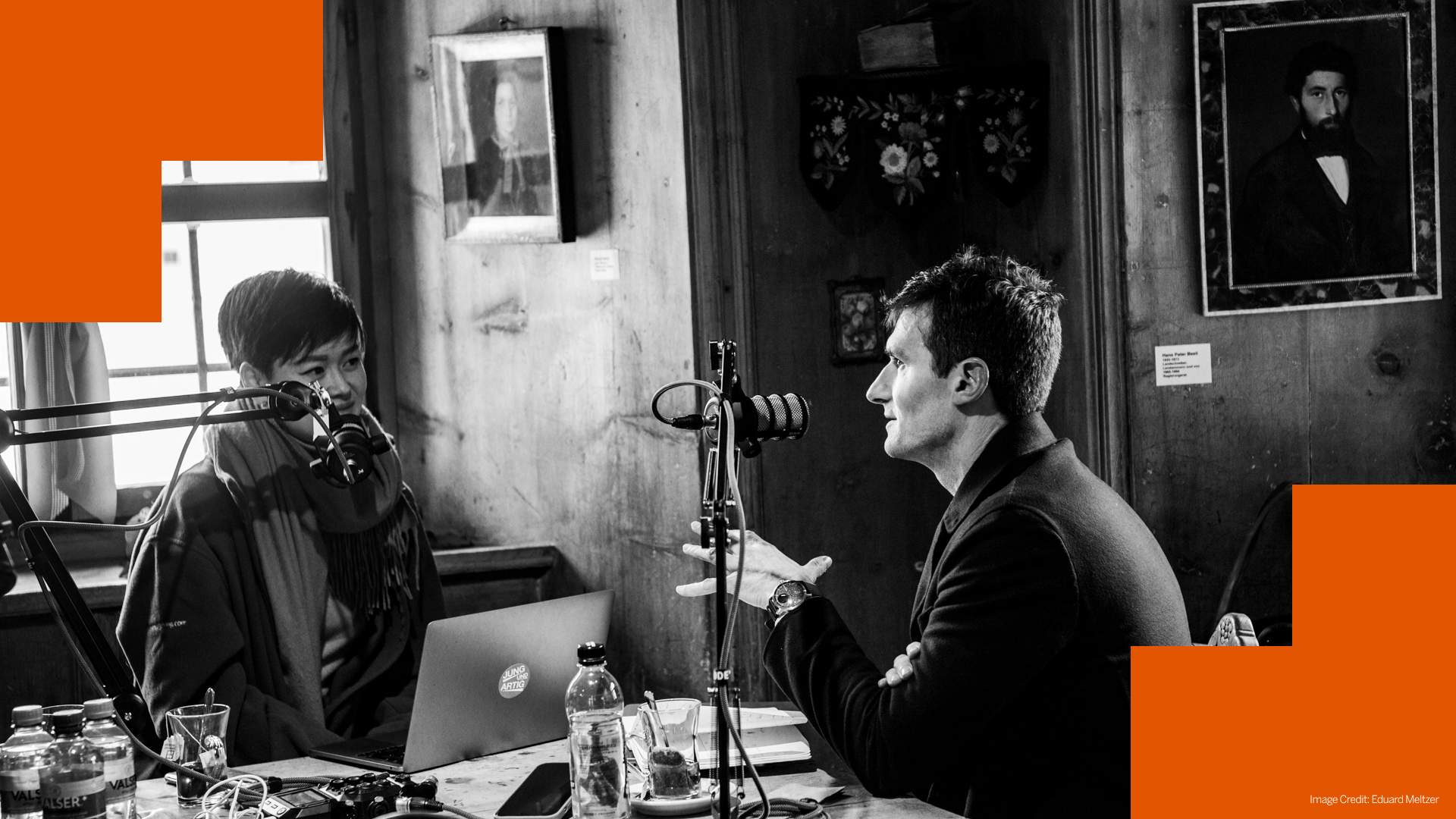
MARISA ZABALAK
founder of Open Channel Culture, educational psychologist, AI ethicist, and climate sustainability leader, on our relationship to climate change
“I think fear can be a huge driver at this time of transformation, but I also think it is an extraordinary opportunity. As a dedicated optimist I believe we have to recognize what’s difficult in the world, and then make a decision that we’re going to find a way—and not just magical thinking, but intentional and careful thinking, maybe opening our minds and our doors and our world to interacting with the people around us. Not only people but other living beings, and the planet, because the planet is talking to us. We are nature, so we also need to speak to nature, communicate with the trees and the sky. I know it sounds a little woo-woo to some people, but it’s just a different way of listening. I think we are capable of doing it. There will be people who feel challenged and who say they can’t do it, but I think the majority of people do actually want to. They just need to believe they can.”
ALEXANDRE PESCHEL
co-founder of Atem, on the future of carbon trading
“We see that carbon markets are evolving rapidly right now. The future carbon market will be working with a different kind of infrastructure that is more decentralized and open for companies and individuals to participate in. We will see higher quality standards, more focus on actual carbon removal, and more tech-based solutions where it’s easier to track that the carbon was really removed. What we’re working on at Atem is that managing carbon and retiring carbon credits become an integrated part of business processes. So not something that is done by a sustainability team that’s not really connected to operations, but part of the default way of doing business in the future.”
SUMIT VIRMANI
CMO of Infosys, on DEI and accountability
“If you look at the data out there, our research shows that less than half of businesses follow up their strategy with accountability. That's the fundamental problem. The second issue is: what do we measure? Do we measure stuff that makes us look good? Or do we measure stuff that actually matters? Because if I’m not wrong, almost 90 percent of companies today have information on how many women are in the workforce. But almost a quarter will have metrics around, when you're analyzing attrition, how many women are leaving. When you're analyzing attrition, how many women of underrepresented communities are leaving? So I think there’s a big gap across organizations on following through the strategy with DEI.“
“Then we need to ask whether a leader is empowered enough to drive accountability across the organization? Yes, we've made progress with diversity officers, and I think we get to see that designation a lot more often. But is that just a title? Or is it actually backed up with a team and an empowerment to have a seat at the table to apply that accountability? And would there be consequences if it does not. That, to me, is a big problem to solve if we are to make progress.”
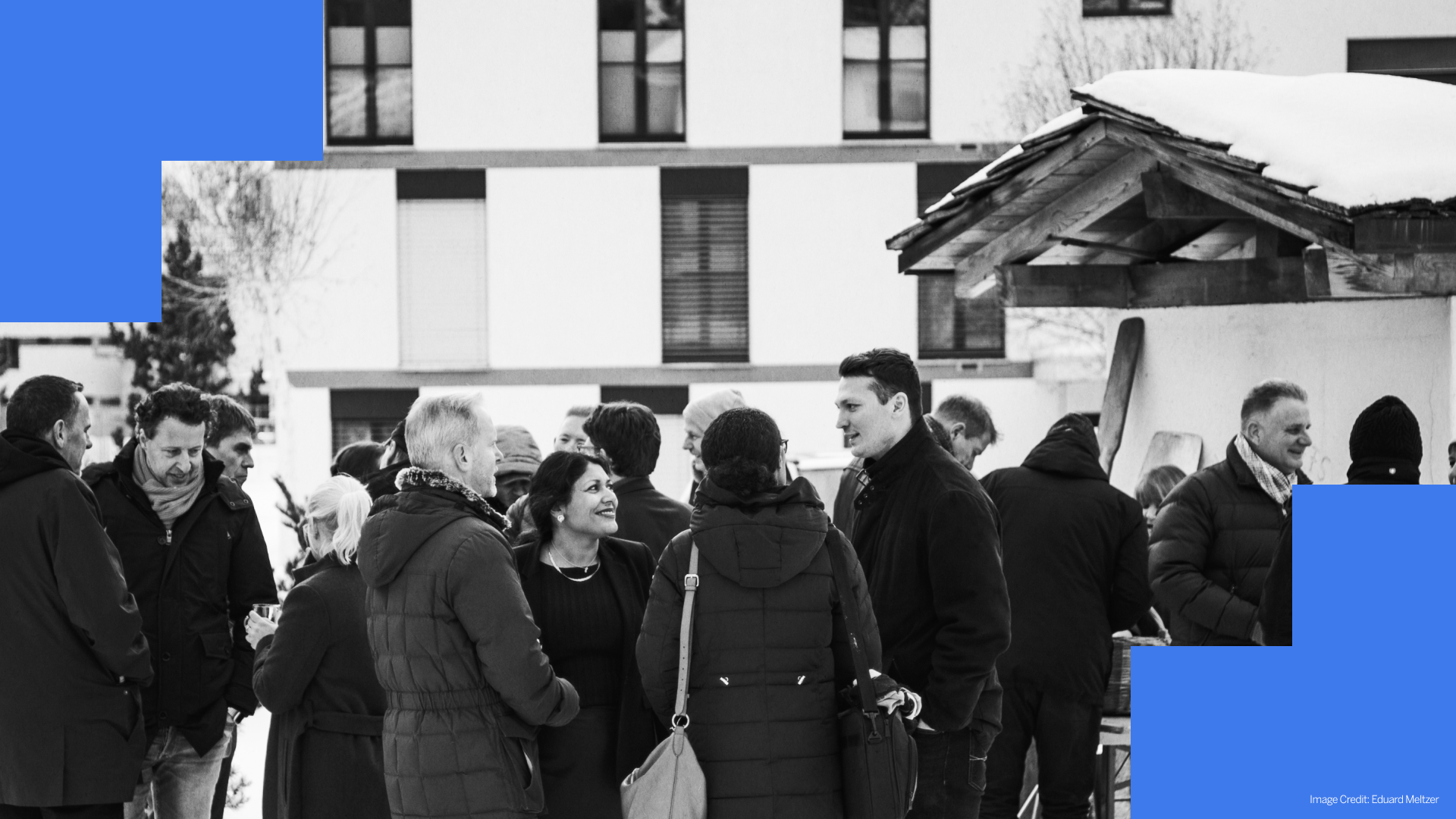
KIM “KIMFER” FLANERY-RYE
founder and principal consultant at Inclusion Equals on tokenism and diversifying boards
“There’s a saying out there that to break the barrier of tokenism, you have to have at least three people, because then one person is not being asked to carry the weight. So, for example, if I am the only woman in the room, and the only minority Asian woman, I'm being asked to literally hold the response for all women, and for all minority groups. More specifically for Asians, which covers 48 different countries. There’s always someone who is the initial token, no matter what, that's just how it happens, unless it's organic, because there’s always a strategy to bring someone in to diversify. And there’s then a lot of innate weight which that individual has to carry: it's not for the faint of heart. I think especially people who have been tokenized in the past, and continue to be tokenized, go into it knowing what we are walking into.”
“I have seen numbers for Davos and they are still abysmal, especially on the main stage. So there are challenges, for sure. But then I see the diversity of people showing up in these spots, the “un-Davos,” more of your ‘everyday’ person coming to make changes happen—that's where I think people are showing up more, rather than being able to afford the primary stage. There is a certain cost that’s associated with that, but it’s also interesting. It’s a ski resort, and you can feel the money and the arrogance in some way, so that's the part that I’m trying to really reconcile for myself. I’m trying to find the people that are trying to be the change. I had a lovely dinner with 14 amazing women last night, who are all just finding their own squads here. I think there is such a culture of giving, with the people that are really here to make changes, and to make connections happen.”
KIM DABBS
VP of ESG and social innovation at Steelcase, on the recent ESG backlash
“I try to help people, not just our employees, and not just our communities, but people at large, to see ESG as a common language. It’s the common language for right now, just like CSR was the acronym 25 years ago. I hope that in another 25 years people will just be talking about impact, and the ESG acronym will start to dissolve because this is just: run the business. And when it gets to that point, when we can start to see all of these metrics, all of the progress being shared equitably, not just within our own company, but across companies, it helps communities understand how to actually view impact through a very, very transparent lens.”
“On the recent criticism, when you talk about one end of the spectrum, those saying that ESG are a distraction from profit, when you start to have to make a business case for human rights, when you start to have to make a business case to preserve and protect communities—that’s not a world I want to live in. That's not a world we want to live in. And on the other side, if we stop all progress from happening, if we can’t see the ‘we’ in the process and understand the collaboration that’s needed, we're never going to find that momentum that we need to push this work forward.”
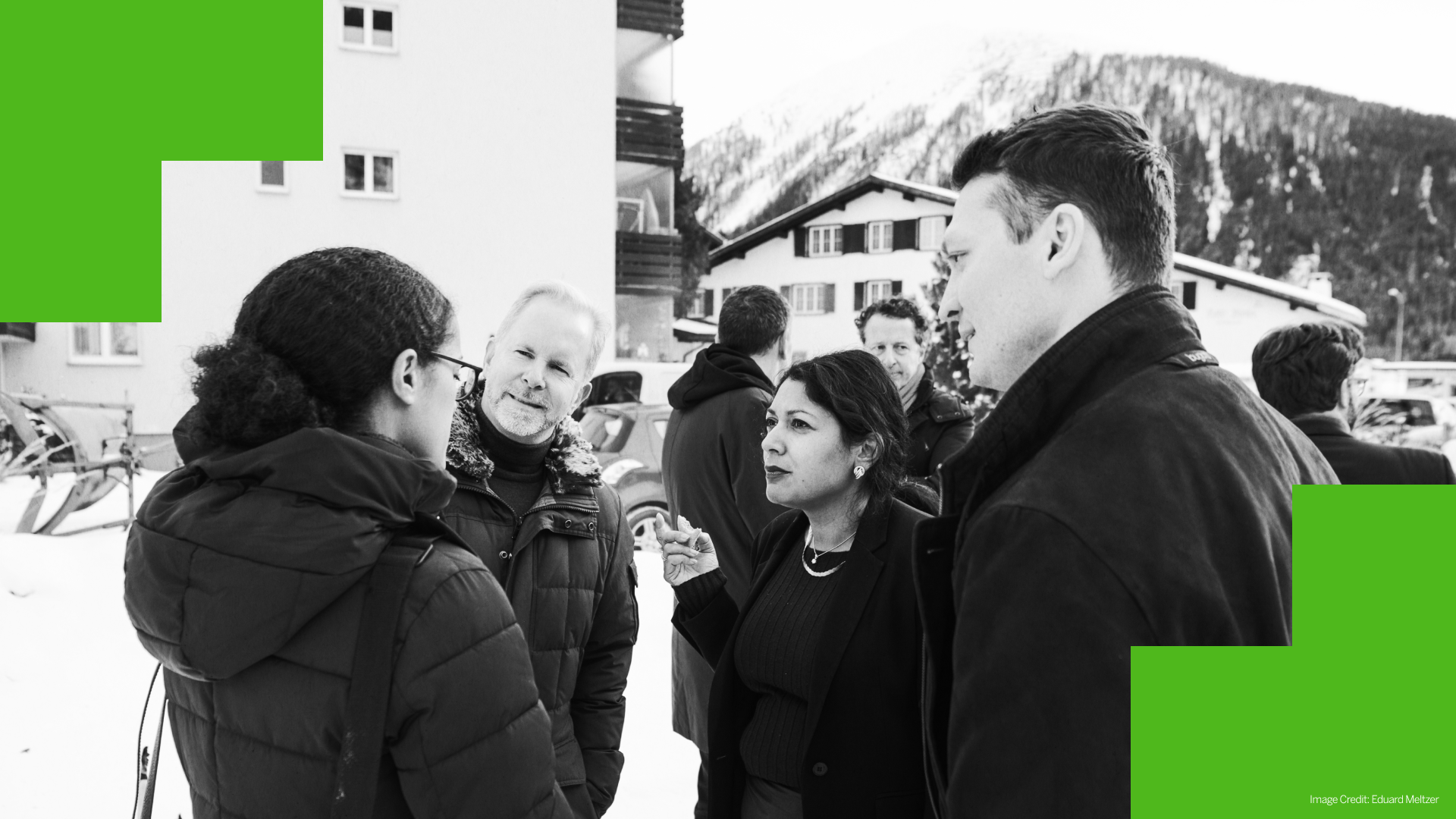
AURONDA SCALERA
curator and co-director of the Infinity Art Museum, on art in Web3
“The Infinity Art Museum is the first museum and contemporary art space on the blockchain, and the first museum that makes commissions from pivotal artists in the physical art world. I’m also the co-founder of XXnft, a publishing platform that seeks to improve the work of women and nonbinary artists in Web3, and I work worldwide with NFT, blockchain, artificial intelligence, and all these new environments. We will open the museum in March, and there are some technicians helping us out to create the event. It’s an environment that you can enter, where you can open a door and walk inside, and find yourself maybe in a mountain, or under the sea—a much more 3D experience than what is usually referred to as an artwork, like a sculpture for example.”
“The difference between NFT art today and that of the past two years is that there is much more quality now. Before, everyone made NFTs, but now there is more of a selection, and we have curators who can help choose this higher quality. All these environments are still changing so quickly.”
CAMILLA DOURAGHY FISCHBACHER
Iranian-American creative director and fine art photographer, on gender apartheid in Iran
“Make the boycotts stronger and sanctions stronger, because the Iranian people have been suffering under the sanctions, the government has not. Declare the National Guard a terrorist organization, which they are, and recall your ambassadors. You mentioned apartheid: absolutely, this is apartheid. We just don't want to see it. But it is and there needs to be a moment when we stand, draw a line, and say enough is enough. We are living in a world community, and what I get very irritated about is how, when we're talking about the Middle East, we are always tiptoeing and saying, ‘well, it's a cultural thing.’ But it's not cultural to be repressed. That's like saying it's cultural for, you know, apartheid. Yeah, there was a culture that did that: we got rid of it. Germany had a shitty culture: they got rid of it. We have a shitty culture: we also want to get rid of it.”
JULIA SINGH
communications officer at United for Ukraine, on the company’s work and relevance in Davos
“We are an international NGO based in Switzerland, focused on driving more help for Ukraine. One side of our help is emergency relief. We help Ukrainians in 40 countries outside of Ukraine to get access to free housing, legal support, and information. And we are also building a recovery initiative in Ukraine to help people inside the country, particularly to connect them with economic opportunities, to rebuild or sustain their businesses. We would like to support female-led businesses and micro-entrepreneurs, to make sure that they have a platform to sustain and rebuild their lives in Ukraine. Even now, when problems are still falling, and long after.”
“To be honest, not everyone is on the same page regarding how important and impactful the war in Ukraine is. But I was very lucky to find a large number of people who care deeply, and who are doing incredible work in their communities to drive help for Ukraine. And that is why I'm here, on a mission to talk about Ukraine with everyone I meet, and remind them that it is not a charity; it is in our own interest to do every single day what we can.”
ILLIA SAMOILENKO
deputy commander of Azov special operations detachment, National Guard of Ukraine, reflecting on his return to Kiev after Russian captivity
“I returned to a different country. I had a very bad prognosis back in May, in that I had no idea what was going on or what was going to happen. But when I returned to Kiev, I saw the people, their eyes, their dedication and support, and their united efforts. And it was just like, wow, finally, now everyone fights, but on different frontlines. Some are comfortable in combat, some like fighting with information. Some have the guts to bear arms, some do not, but I am not judging anyone, because everybody should be useful wherever he is right now. Everyone should do his own job. My job is to serve and I still serve. I remained in service in 2017 after my injury. I made my choice. We in the military have given up our lives to society, and we expect nothing in return. But society gives us back a lot. And this means being united.”
